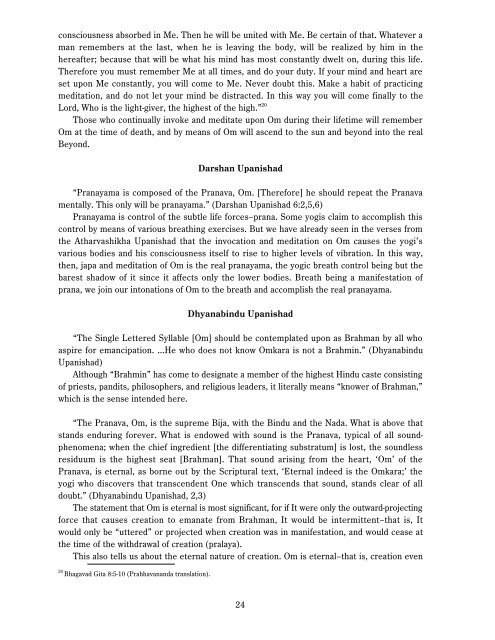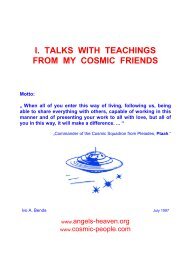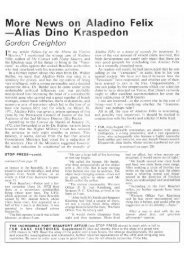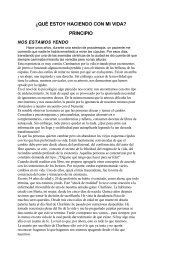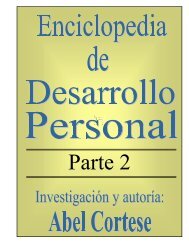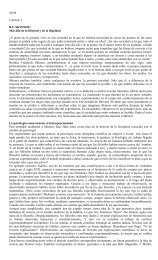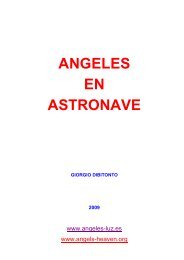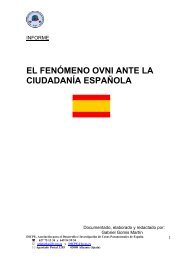The Word That is God
The Word That is God
The Word That is God
Create successful ePaper yourself
Turn your PDF publications into a flip-book with our unique Google optimized e-Paper software.
consciousness absorbed in Me. <strong>The</strong>n he will be united with Me. Be certain of that. Whatever a<br />
man remembers at the last, when he <strong>is</strong> leaving the body, will be realized by him in the<br />
hereafter; because that will be what h<strong>is</strong> mind has most constantly dwelt on, during th<strong>is</strong> life.<br />
<strong>The</strong>refore you must remember Me at all times, and do your duty. If your mind and heart are<br />
set upon Me constantly, you will come to Me. Never doubt th<strong>is</strong>. Make a habit of practicing<br />
meditation, and do not let your mind be d<strong>is</strong>tracted. In th<strong>is</strong> way you will come finally to the<br />
Lord, Who <strong>is</strong> the light-giver, the highest of the high.” 20<br />
Those who continually invoke and meditate upon Om during their lifetime will remember<br />
Om at the time of death, and by means of Om will ascend to the sun and beyond into the real<br />
Beyond.<br />
Darshan Upan<strong>is</strong>had<br />
“Pranayama <strong>is</strong> composed of the Pranava, Om. [<strong>The</strong>refore] he should repeat the Pranava<br />
mentally. Th<strong>is</strong> only will be pranayama.” (Darshan Upan<strong>is</strong>had 6:2,5,6)<br />
Pranayama <strong>is</strong> control of the subtle life forces–prana. Some yog<strong>is</strong> claim to accompl<strong>is</strong>h th<strong>is</strong><br />
control by means of various breathing exerc<strong>is</strong>es. But we have already seen in the verses from<br />
the Atharvashikha Upan<strong>is</strong>had that the invocation and meditation on Om causes the yogi’s<br />
various bodies and h<strong>is</strong> consciousness itself to r<strong>is</strong>e to higher levels of vibration. In th<strong>is</strong> way,<br />
then, japa and meditation of Om <strong>is</strong> the real pranayama, the yogic breath control being but the<br />
barest shadow of it since it affects only the lower bodies. Breath being a manifestation of<br />
prana, we join our intonations of Om to the breath and accompl<strong>is</strong>h the real pranayama.<br />
Dhyanabindu Upan<strong>is</strong>had<br />
“<strong>The</strong> Single Lettered Syllable [Om] should be contemplated upon as Brahman by all who<br />
aspire for emancipation. …He who does not know Omkara <strong>is</strong> not a Brahmin.” (Dhyanabindu<br />
Upan<strong>is</strong>had)<br />
Although “Brahmin” has come to designate a member of the highest Hindu caste cons<strong>is</strong>ting<br />
of priests, pandits, philosophers, and religious leaders, it literally means “knower of Brahman,”<br />
which <strong>is</strong> the sense intended here.<br />
“<strong>The</strong> Pranava, Om, <strong>is</strong> the supreme Bija, with the Bindu and the Nada. What <strong>is</strong> above that<br />
stands enduring forever. What <strong>is</strong> endowed with sound <strong>is</strong> the Pranava, typical of all soundphenomena;<br />
when the chief ingredient [the differentiating substratum] <strong>is</strong> lost, the soundless<br />
residuum <strong>is</strong> the highest seat [Brahman]. <strong>That</strong> sound ar<strong>is</strong>ing from the heart, ‘Om’ of the<br />
Pranava, <strong>is</strong> eternal, as borne out by the Scriptural text, ‘Eternal indeed <strong>is</strong> the Omkara;’ the<br />
yogi who d<strong>is</strong>covers that transcendent One which transcends that sound, stands clear of all<br />
doubt.” (Dhyanabindu Upan<strong>is</strong>had, 2,3)<br />
<strong>The</strong> statement that Om <strong>is</strong> eternal <strong>is</strong> most significant, for if It were only the outward-projecting<br />
force that causes creation to emanate from Brahman, It would be intermittent–that <strong>is</strong>, It<br />
would only be “uttered” or projected when creation was in manifestation, and would cease at<br />
the time of the withdrawal of creation (pralaya).<br />
Th<strong>is</strong> also tells us about the eternal nature of creation. Om <strong>is</strong> eternal–that <strong>is</strong>, creation even<br />
20 Bhagavad Gita 8:5-10 (Prabhavananda translation).<br />
24


